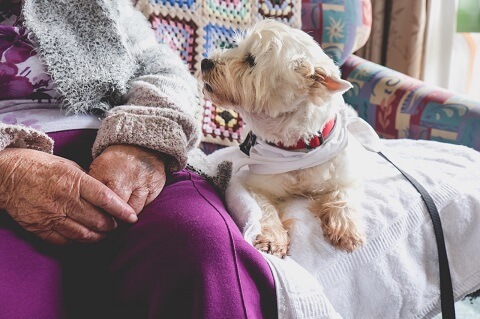
Page contents
For many older people, their beloved dog or cat is often their closest companion. Parting with their pet to move into a care home alone can be hugely traumatic and akin to a bereavement.
Many care homes allow pets
However, many care homes will allow you to bring your pet with you. People have been known to keep cats, guide dogs, hamsters, rabbits, even their own chickens in care homes. Staff can even help you to care for your pet, get supplies and take it to the vet.
A common concern for potential residents
Paulina Frisby, Care Helpline team leader at carehome.co.uk, said: “It is hard enough for someone to make the life-changing move into a care home, let alone if they have to leave their beloved pet behind. We have had people ring our care helpline very worried about what is going to happen to their pet if they move into residential care.
“Consequently it is heartening that nearly half of care homes do accept pets. This enables people to take what is often their closest companion with them.
“We can help care seekers find a care home that is right for their needs as well as their pet. Recently we had a lady ring in who had two cats that she was very attached to. She could no longer care for them but we found a care home that had a resident cat she would be able to spend time with.
“We recognise that pets can give people a sense of purpose as well as unconditional love so do our best to ensure they can stay together. The next best thing is a care home with a resident dog or cat or one that regularly has pet therapy visits. On the care helpline we do our utmost to match a person to the care home that is right for them.”
Pet policies in care homes
The animal charity Blue Cross would like to see all care homes having a clear pet policy in place after it found that when a care home says it is pet-friendly it may just mean pets are allowed to visit, or the care home has a resident pet or that staff bring their pets to work.
So it is crucial to check with the care home about what their pet-friendly policy really entails.
Diane James from the Blue Cross Pet Bereavement Support Service says: “Calls from older people forced to give up their pet because they are going into a care home are heart-breaking. Not only are pets a critical companion in older people’s lives, they may also be the last link to a deceased spouse or happy memory. At an already difficult time for many older people, losing their pet can be seriously traumatic for them.”
The charity’s public affairs officer, Anna Wade, adds: “Pets offer much-needed companionship for older people and can help to alleviate feelings of loneliness and isolation. Pet therapy has been shown to reduce depression and anxiety in elderly care home residents as well as encouraging more social interactions among residents.
“As well as benefits to mental health and wellbeing, there are also physical health benefits. Studies have shown improvements to general fitness, with pet owners being more active in daily life than non-pet owners.”
Research into benefits of pets in care homes
A research project by the University of Lincoln and the University of Liverpool, funded by the Dunhill Medical Trust, has examined the experience of people who have had to separate from their pet /companion animal when they move into a care home and the effect that has.
The researchers explored the benefits of having a companion animal to care for, care homes’ pet policies, how available and accessible information was for care seekers and the legal rights of pet owners.
The team have also produced an animation to help to raise awareness of the issue:
How to find a pet-friendly care home
The Cinnamon Trust is a charity that helps elderly and terminally ill people with the care of their pets. As part of this, they have compiled a nationwide register of care homes and retirement villages that are pet-friendly.
In addition, carehome.co.uk has a search option where you can look for pet-friendly homes in your area. Just under half of care homes in the UK describe themselves as pet-friendly.
We have a list of pet-friendly care homes.
Connie and her parrot Joey
Connie is 88 years old and a resident at Excelcare’s Fitzwilliam House care home, in Cambridge. She was able to bring her beloved pet parakeet to live with her at the home.
Claire Keen, home manager at Fitzwilliam House said: “Connie has had Joey for the last 20 years, so he’s a big part of her life and has been through a lot with her, making him the perfect companion for life at Fitzwilliam.
“She proudly keeps Joey in her room, much to the delight of other residents who pop by to visit. He’s quite a talkative bird and keeps everyone in the home entertained with his witty commentary. Connie even taught him his name, which he says on request as a little party trick.
“Animal company is really beneficial for the residents. It provides them with something to look after, increasing self-confidence, independence levels, and boosting their wellbeing. His cheeky nature is a hit with everyone at Fitzwilliam. He regularly brings the comedy when he’s out in the communal areas. Bringing her beloved pet along with her has helped Connie to settle in very well at the care home. She’s even become a bit of a celebrity!”
Esther and her chihuahua Maisy
Esther Matthews is 101 years old. She has lived at Anchor’s Cranlea care home in Newcastle since March 2019.

Esther was an independent lady and was reluctant to move from her family home into residential care. One of Esther’s biggest worries was leaving her long-haired chihuahua Maisy (14 years). It was agreed Esther could bring Maisy with her to Cranlea.
The staff support Esther to care for Maisy. Maisy is a massive part of Esther’s life. Maisy is loved by all of the residents in Cranlea. She will often pop into the lounge where she sits on Esther’s knee.
Esther says: “When I came to Cranlea it was on the understanding that Maisy came too. We come as a pair. Maisy is a great comfort to me and a companion.”
Patricia and her dog Winnie

After a long and arduous search for a care provider that accepts pets, Patricia Cooper moved from her home to an extra care scheme.
The 83-year-old moved to Rosewell House in Tonbridge due to Rapport Housing & Care’s pet policy. She says: “I just couldn’t move if I couldn’t take Winnie with me and most places would not accept pets.”
“I am over the moon”, she said. “I grew up around here, so it is wonderful to be back. I’m just thrilled I could bring Winnie with me. In my old home, I was lonely. I never saw anyone and I couldn’t manage the stairs, so I was sleeping in the living room.”


